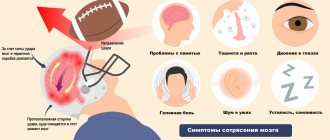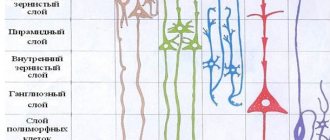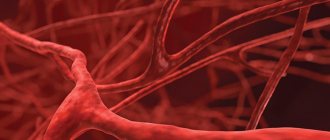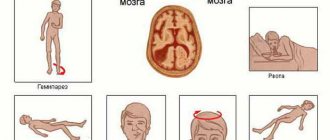When is it necessary to take vitamins?
Until the age of three, a child absorbs information from the world around him like a sponge. At this time, it is important to pay attention not only to classes, creating a developmental environment and memory training. The child must receive all the substances necessary for the formation of a healthy brain and nervous system. A balanced and nutritious diet can prevent acute vitamin deficiency. However, a lack of some elements is still possible.
Vitamins for memory and brain development can be obtained from food, the main thing is that the diet is balanced
Deficiency leads to deteriorating memory, problems with learning and reduced immunity. Therefore, twice a year, in spring and autumn, some pediatricians advise taking vitamins for the development of brain activity for children. But there are other situations in which these drugs are indicated:
- If the examination reveals a deficiency of an element. As a rule, in this case, the doctor prescribes one or two medications to fill the deficiency of the substance.
- In conditions of increased mental activity, for example, during exams or preparation for a session, when strong memory and attention are especially needed. Children's vitamins have a gentle effect on the child's body, increasing its concentration.
- An unbalanced diet that is not able to provide all the necessary microelements.
Children's vitamins: what are they and does your child need them?
Manufacturers offer drugs that differ according to various criteria: taste, smell, naturalness. But basically, vitamins for children differ in two ways: composition and release form.
The composition of vitamins for children is:
- containing only one component - one-component;
- with different vitamins, usually combined with each other;
- vitamin-mineral complexes - with several vitamins and minerals in the composition.
Possible forms of release:
- drops, syrups without a pronounced taste and smell - for children who still find it difficult to swallow tablets and even chew pills;
- chewing lozenges, marmalade, often in the form of toys or cartoon characters with fruit flavors - for children of senior preschool and primary school age;
- regular tablets washed down with water - for middle and high school students.
You should not take vitamins uncontrollably, especially when it comes to children's medications. Well-known pediatrician Evgeny Komarovsky says that Russian doctors are much more likely to encounter an overdose of vitamins in young patients than with their deficiency. At the same time, according to surveys among parents of children aged one year and older, about 20% of mothers and fathers give their children vitamins constantly and only 10% of parents consult a doctor before choosing medications.
In fact, it is enough for a healthy, active child to take vitamins twice a year according to the schedule specified in the instructions for a particular drug. It is advisable that the vitamins be selected by a pediatrician, but if there is no opportunity to consult a doctor, and you are confident in the good health of your child, you can independently select an option from the rating of the best vitamins for children from manufacturers that have proven their reliability.
Parents can determine whether a child needs to take vitamins by the following signs:
- the child often catches colds;
- the child gets tired quickly, suffers from poor appetite;
- There are problems with nails, teeth, hair (fragility, fragility, loss).
It would not be a bad idea to take a course of vitamin complex during periods of active growth and speech development: at 2-3 years old, at 6-7 years old, for teenagers 11 years old and older, depending on the pace of development.
What vitamins do children need for their mind and memory?
There are many microelements, and they all play their role in the human body. For example, B vitamins are responsible for the functioning of the brain and nervous system. For the human body, they are necessary for:
- normal course of metabolic processes;
- amino acid synthesis;
- improving intestinal function and skin condition;
- heart function;
- biosynthesis of neurotransmitters;
- reducing stress.
A group B nutrient is not a single compound, but several substances containing a nitrogen molecule. This group includes:
- B1 – thiamine;
- B2 – riboflavin;
- B3 – nicotinic acid;
- B9 – folic acid;
- B5 – pantothenic acid;
- B6 – pyridoxine;
- B12 – cyanocobalamin.
But the above elements are not enough for the full functioning of the brain. Vitamin C is no less important for children; it helps thiamine and folic acid to be absorbed. It protects the brain from oxidative stress and prevents tissue degeneration, so it is even recommended for patients with Alzheimer's disease.
Without vitamin C, the absorption of iron deteriorates, on which the full development of memory and thinking directly depends.
Human intelligence is also influenced by the fat-soluble element A, which protects brain cells from stress and negative factors. It has been proven that its deficiency negatively affects the development of children and can lead to problems with memory and attention. Another vital element is calcium. It is involved in many metabolic and other processes of the body, and therefore, with its deficiency, cognitive functions are significantly reduced.
Vitamins for memory for adults
The role of the nervous system is to perceive and analyze information received from outside. In addition, it guides human movements and is responsible for the coordinated work of the entire body. The manifestations of higher nervous activity are speech, emotions, memory and intellect. Interestingly, disruption of biochemical reactions in the brain primarily affects the quality of memory.
List of drugs to improve memory:
- “Neurostrong” (Artlife, Russia). A bioactive complex designed to strengthen the nervous system, accelerate recovery processes after a stroke, and prevent dysfunction of the microvasculature of the brain. The composition of the drug includes: L-glutamic acid, ginger, licorice, ginkgo biloba, lecithin, blueberries, vitamins B1, B3, B6.
The dietary supplement is prescribed 1 tablet 3 times a day for 2-3 weeks.
- "Intellan" (Herbion Pakistan, Pakistan). Organic supplement, which includes 6 types of medicinal herbs (Ginkgo biloba, Centella asiatica, Herpestis monniera, Coriander sativum, Amomum subulate, Emblica officinalis). The drug is used to stimulate brain activity by activating neurotransmitter centers, relieving anxiety of a psychogenic and neurotic nature, increasing intellectual abilities, and eliminating dizziness caused by neurosensory changes.
Standard dosage regimen: 1 capsule or 10 milliliters of syrup twice a day.
- NeuroPlus (Vitaline, Russia). A natural biocomplex that improves memory, attention, and mood. Active ingredients: gotu kola, ginger, licorice, ginkgo biloba. With regular use of the supplement, blood flow, and therefore oxygen, to tissues improves, the permeability of the vascular wall decreases, the vitality of the body increases, the regeneration of retinal pigment accelerates, and psychomotor and speech development accelerates.
The drug is taken three times a day, 1 capsule after meals.
- “Memory Rise” (Artlife, Russia). A therapeutic and prophylactic drug for optimizing the nutrition of brain cells, increasing concentration, and improving memory. The dietary supplement will include plant extracts (gotu kola, motherwort pentaloba, ginkgo biloba, prickly hawthorn, Korean ginseng, guarana, horse chestnut), amino acids (L-glutamine, L-methionine, L-tyrosine, L-phenylalanine, L-carnitine , gamma-aminobutyric acid), vitamins (B1, B3, , B5, B6, , B9, B12), macroelements (calcium, magnesium).
For preventive purposes, the drug is taken 1 - 2 tablets twice a day, for therapeutic purposes - 2 pills 3 times a day.
- “Brain and Memory” (Herb Pharm, USA). Colloidal solution to normalize mental activity, reduce nervous excitability and improve sleep. The concentrate contains extracts of gotu kola, ginkgo biloba, skull cap, sage and rosemary.
The drug is taken in between meals, 0.7 milliliters 2-3 times a day.
Foods rich in vitamins for the brain and memory
To prevent vitamin deficiency and develop memory in children, it is important to create a balanced menu. Products that improve memory and brain function have long been known:
- red fatty fish (salmon, salmon);
- nuts;
- cocoa and dark chocolate;
- coffee;
- melon;
- eggs.
- broccoli;
- olive and linseed oil;
- avocado.
We recommend reading: Useful properties and contraindications of avocados
Brain function and memory are improved by foods containing B vitamins, unsaturated fatty acids or Omega-3. Unfortunately, usually fish and fresh fruits and vegetables are not cheap, so they do not appear in the diet as often as they should. And not all nutrients obtained from food are absorbed. For example, in order to compensate for vitamin E deficiency, you need to eat at least a kilogram of walnuts.
Vitamins and minerals to improve memory
The functioning of the brain, the ability to concentrate, remember, and process received information are mainly influenced by:
| Vitamin/mineral | Function | Sources in products | Signs of Deficiency |
| B1 (thiamine) | improves brain function, activates memory, helps increase cognitive activity, regulates the functioning of the nervous system. | legumes, cereals, nuts, pork, beef, wholemeal baked goods. | loss of appetite, increased irritability, insomnia, fatigue, decreased memory, inability to concentrate. |
| B6 (pyrodoxine) | helps the work of neurotransmitters that are involved in the construction of brain cells, and also influence behavioral reactions, sleep, and mood. | chicken, whole grains, fish, beans, nuts. | depression, anxiety, muscle spasms, frequent urge to urinate. |
| D | preserves the elasticity of brain vessels, prevents atherosclerosis | parsley, caviar, butter, egg yolk, tuna | impairment of the brain's ability to plan, process recent memories |
| E | binds free radicals, thereby reducing or preventing the damage they cause to brain neurons. | sunflower, corn oil, unprocessed grains, nuts, seeds, avocado, spinach. | are observed rarely, manifested by impaired coordination of movements, muscle weakness. |
| Selenium | regulates the level of thyroid hormones, helps maintain the immune system, improves the functioning of brain cells. | oatmeal, buckwheat, corn, meat, offal, shrimp, oysters, squid, seaweed. | lack of energy, depressed mood, decreased body defenses, muscle pain. |
| Zinc | promotes the formation of brain cells, strengthens the immune system, and supports hormonal levels. | crustaceans, beef, dark chicken meat, sprouted wheat grains, brewer's yeast. | loss of appetite, stunted growth, decreased immunity. |
| Iodine | regulates metabolism, improves the functioning of brain cells. | seafood, seaweed, iodized salt. | growth and development delay due to thyroid dysfunction. |
| Iron | necessary for the transport of oxygen from the lungs to all cells of the body, including brain cells, helps improve concentration. | pork, beef, lamb, beans, buckwheat, corn, apples. | weakness, inability to concentrate, dizziness, irritability, drowsiness, memory loss, pallor. |
| B12 (cyanocobalamin) | participates in various biochemical reactions, contributes to the normal functioning of the nervous system. | animal products: meat, milk, eggs, offal. | anemia, weakness, rapid heartbeat, impaired reflexes, memory impairment. |
The best vitamins for children for memory development
Choosing vitamins for brain development and memory for children is a difficult matter. Irresponsible manufacturers often add dyes and flavors that can cause allergies in children. Considering that now every second person is susceptible to this disease, you need to choose especially carefully.
Pikovit
"Pikovit" is one of the most affordable dietary supplements in the pharmacy. It contains the following substances:
- zinc;
- iodine;
- selenium;
- thiamine;
- vitamin D;
- vitamin B6;
- vitamin B12;
- ascorbic acid;
- vitamin PP.
In addition to the active ingredients, Pikovit also contains tangerine flavor, magnesium stearate, polysorbate and aspartame.
Multi-tabs Junior
Another budget vitamin complex that is suitable for children from four to eleven years old. The composition of this drug is impressive: Multi-Tabs contains 11 vitamins, including A, E, D and B, and 7 minerals. Chewable tablets are available in several flavors, so children enjoy drinking them.
Alphabet Schoolboy
As you can guess from the name, this complex is intended for children from 7 to 14 years old. One package contains 60 tablets, which are enough for a month; this is the course that is considered optimal.
Nutrients in the product do not interfere with each other’s digestibility. For example, complex No. 1 contains vitamins C, B1, A and iron and copper. And complex No. 2 contains vitamins C, E, B2, B6, A and magnesium with zinc.
Vita Bears
Perhaps the most favorite supplement among children. They produce vitamins in the form of gummy bears, and kids eat them with great pleasure. The composition includes all the substances necessary for brain function. Children from 3 years old can take Vita Bears. These are good brain development vitamins for children that have virtually no side effects.
Vitrum junior plus
has long established itself as a reliable manufacturer. The complex for children includes the following elements:
- vitamin C;
- vitamin A;
- vitamin D;
- all B vitamins;
- vitamin K1;
- biotin;
- iodine;
- iron;
- potassium.
What distinguishes it from others is the presence of vitamin K1 in its composition. The drug can be taken by children from 7 years of age.
Popular questions from parents about children's vitamins
Questions about vitamins that parents ask especially often:
At what age should a child be given vitamins?
Vitamins in the form of drops can be given to a baby from the first days of life as prescribed by a doctor.
Is the natural composition of vitamins important?
It is desirable that the composition of the chosen product be as natural as possible. In the middle price category, semi-synthetic vitamins predominate - they are well absorbed and rarely provoke allergies. The body absorbs completely natural vitamins perfectly, but such preparations are expensive and difficult to find on sale. Fully synthetic drugs have a low price, but they are absorbed by the body for a long time.
Does my child need to take vitamin and mineral complexes on a regular basis?
No, it is enough to take vitamins in a course according to the instructions for the drug, no more than two courses a year. It is best to take vitamins during the off-season periods: spring and autumn.
What vitamins are especially important for a child's development?
Most often, children have a deficiency of vitamins C and group B - it is desirable that these vitamins be part of the chosen product. Vitamins A, D, E can be obtained in sufficient quantities by simply adjusting the child’s diet.
How to choose the right vitamin complex
Finding the right vitamins for children to improve memory and attention can be difficult. When choosing, the following details are important:
- Compound. Multivitamin complexes are suitable for prevention. But if there are already problems, then it is better to give preference to mono-drugs.
- Age group. It is difficult to find something suitable in a pharmacy for children under 3 years of age. But for 3-4 year olds there are many more options. Before purchasing, you need to make sure that the selected complex is suitable for the child.
- Digestibility. The right combination of microelements is no less important than other factors. For example, vitamin C is best taken with vitamin E. But in combination with B1 and B12, it is practically not absorbed.
- An overdose of microelements is much more dangerous than their deficiency. The content of nutrients in the preparation should not exceed daily norms. In addition, do not forget about the substances that enter the body with food.
Vitamins are involved in many metabolic processes; if they are deficient, academic performance and memory may deteriorate
How to take vitamins
Synthetic vitamins are absorbed worse than those found in food. Therefore, they must be taken according to a certain scheme. Vitamins for a child’s mental development are best given in the morning, as they increase the activity of the nervous system. If you mix up the time and take them in the evening, you may experience insomnia.
Also, you should not take several vitamin complexes at the same time, as this can lead to an overdose. When using Pikovit or Vita Mishek, urine may turn yellow. This is due to the presence of vitamin B2 in the composition and is not considered an alarming symptom.
Since most drugs contain vitamin C, they are not recommended to be taken simultaneously with streptocide. Ascorbic acid enhances its side effects.
With caution, you need to combine nutrients with tetracycline, which is the main active substance in drugs such as Tigocil and Minolexin.
The benefits of vitamins for children's brains
Providing the body with enough vitamins and minerals helps solve the most important problems:
- increases the level of intelligence;
- helps to assimilate and remember educational material more easily;
- increases concentration;
- supports brain activity;
- helps improve academic performance;
- prevents mental fatigue
Vitamins for the brain and memory for children increase the quality of thought processes, improve memory, concentration, and speed of thinking. Ready-made vitamin complexes eliminate increased nervousness and irritability, help maintain inner calm, and protect against stress. This effect is achieved due to the improvement of brain vessels, improved cerebral circulation, rapid tissue regeneration, and normal supply of brain cells with oxygen and nutrients.
for children to take vitamins for the brain and memory after consultation with a specialist, since many of them affect cerebral circulation, and it is necessary to know in advance about the possible side effects of taking such drugs.
Contraindications
Dietary supplements are not always useful; in some cases they can cause serious harm. To avoid deterioration in health, before taking medications, you must consult a doctor and undergo all necessary tests.
The main contraindication is an excess of trace elements in the blood. Overdose can cause headaches, cramps, nausea and kidney stones. Another reason not to take supplements is an allergy or hypersensitivity to one of the components of the drug. You should also take vitamins carefully if your child is diagnosed with thyroid disease.
Komarovsky's opinion
Parents are constantly worried about the health of their children. They buy dietary supplements with only good intentions, but sometimes instead of boosting immunity they end up with a rash or hyperexcitability.
Dr. Komarovsky is of the opinion that not everyone needs vitamins that improve a child’s memory. At the same time, he does not deny the importance of microelements, but emphasizes that children can receive supplements only on the recommendation of a doctor and only in case of symptoms of their deficiency. This means that you should not run to the pharmacy just like that. But if the child has become lethargic, distracted and sad, then you should contact a specialist and listen to his advice.
Komarovsky recommends avoiding prophylactic use. In his opinion, this will not bring the same results as a usually varied and balanced menu. Instead of vitamins for the development of brain activity, it is better for parents not to give their children the same foods for a long time and introduce more vegetables and fruits into the diet.
Before taking medications, consult a doctor










